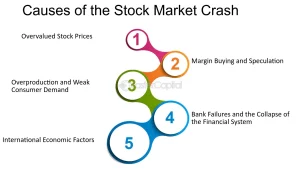Are you thinking about investing in banks? As a result, it is important to understand the conditions that can reduce its value. In this post, we will consider how to determine the deteriorating banking budgets and variables that cause the bank to be low. We will also go to tactics to protect your money and understand market factors that affect the global banking sector. So, if you are ready, let’s start!

Table of contents: What causes bank stocks to drop?
. What Factors Lead to Decreased Bank Stock Values?
. Strategies for Protecting Your Investment in Bank Stocks
. Understanding Market Forces That Impact Bank Stocks
It is no secret that the stock market can be a volatile place, and that bank stocks are not an exception. When it comes to banking stocks, there is a variety of factors that can cause low prices. From economic contraction to variable to regulations, understanding the reasons for low banking stocks is essential in making enlightened investment decisions.
One of the most common reasons for bank stocks is economic stagnation or slowdown. When people lose their jobs or have less money available for spending and borrowing, banks also tend to suffer due to low demand for loans and other services they provide. This decrease in the demand leads to a decrease in bank profits, which ultimately affects the price of their share, as investors have become cautious against buying to a company with a decrease in profit capabilities.
There is another factor that can lead to low stock prices in banks, which is changes in government regulations regarding lending practices or interest rates determined by central banks such as the Federal Reserve (Fed). These changes can affect the amount of money that banks achieve from lending money at different rates, so when these policies change, they often lead to a decrease in profits that translate into low stock prices in Wall Street.
Finally, there is another major reason that some bank shares are due to just because investors do not trust them anymore after the scandals that involve fraud or mismanagement in public opinion came out – this type of negative advertising often causes people who have shares in these companies selling Which quickly led to sharp declines over short periods before things settled again again, information is available about the position presented.
How to Spot the Signs of a Bank Stock Drop.
It may be difficult to discover signs of low bank shares, but there are some main indicators that you should search for. One of the most common reasons is when investors are concerned about the bank’s financial health. If there are reports on bad losses or loans, this may lead to a decrease in stock prices. In addition, if banks fail to meet their regulatory requirements or have difficulty meeting customer demands, this may also cause shares.
There is another factor that can affect stock prices, which is changes in interest rates and economic conditions. When interest rates rise, banks may need more capital reserves that can lead to less than profits and reduce stock prices, as well as decrease profits for shareholders. On the other hand, when interest rates drop, this may make borrowing easier for customers, which increases profits and higher stock values for banks over time.
In the end, news events like natural disasters or political unrest can also affect banking shares negatively due to consumer trust and lack of spending during these times, which by investing their money in banking institutions Takes away until things come again in speaking financially.
Overall overall, getting aware of these factors will help you understand what the bank shares cause to leave so that you can know that before they have possible, the possible loss is best How to save!
What Factors Lead to Decreased Bank Stock Values?
When it comes to investing in the stock market, one of the most important factors to consider is what causes bank shares. Unfortunately, there are a number of different factors that can lead to a decrease in bank stock values. When the economy takes a shrinkage, banks may have to reduce lending activities and increase their reserves due to increased risk associated with loans and other investments.
This can lead to investors away from bank stocks because they become less attractive investments when compared to sectors or other industries that may be more stable during the period of economic recession or depression.
Another factor that can cause low banking stock prices, which is the changes in interest rates set by central banks such as the American Federal Reserve (Fed). When interest rates rise, it becomes more expensive for banks and financial institutions alike, which affects the margins of profitability that lead investors away from bank shares as well as reducing the total demand on them in the open market.
Strategies for Protecting Your Investment in Bank Stocks.
If you have invested in bank stocks, this may be a great way to diversify your wallet and earn some money. However, there are some risks associated with investment in the banking sector that may cause your investment to decrease. To protect yourself from these possible losses, here are some strategies to protect your investment in banking shares.
1. Monitor the bank’s performance: It is important to monitor how banks do financially. Track their financial data and search for any signs of a problem such as low profits or increased debt levels. If you notice anything related to, think about selling part or all your property before the situation increases more.
2. Diversify your portfolio: Do not lay all your eggs in one basket when it comes to investing in the banking sector by purchasing shares only from a specific company or even a few companies in this industry. Instead, it spread across different banks so that if one of the shares decreases dramatically due to the unexpected conditions, all your investments will have at least damage as a result.
3. Investment in joint investment funds and security manufactures funds: Common investment funds and funds circulated on the stock exchange (ETFS) for investors are exposed to multiple securities within the asset category such as banking services without buying individual shares directly-which can be more dangerous than possessing the ETF Mutual Fund Since they do not have direct control of the assets that these units contain at any time. This allows investors more flexibility when it is time to make a decision if they want to continue their positions or move to another place depending on the market conditions without risk greatly along both directions
4. Consider the outcomes of sales strategies: The open sale includes shares of borrowing from another investor who already owns it and then sells these borrowed shares immediately in the market – hoping that the prices are low so that they can buy the cheapest later in the landing line and thus achieve the difference between the two prices
Understanding Market Forces That Impact Bank Stocks.
It is not a secret that bank shares can be volatile. Understanding the market forces affected by the key to making enlightened decisions regarding your investments. From the economic slowdown to the changes in interest rates, there is a variety of factors that can cause bank shares to decrease.
One of the most common reasons for low banking stock prices is economic stagnation or slowdown. When consumers and companies have less funds for spending, banks may suffer from low demand for loans and higher virtual rates on current loans, which leads to low stock prices as investors become more cautious about investing in them.
Changes in interest rates also play an important role when it comes to bank stocks. If the Federal Reserve raises its standard price, the banks may benefit from increasing profits due to the high lending margins; However, if they reduce it, this may reduce their income and lead to a decrease in their share price accordingly.





